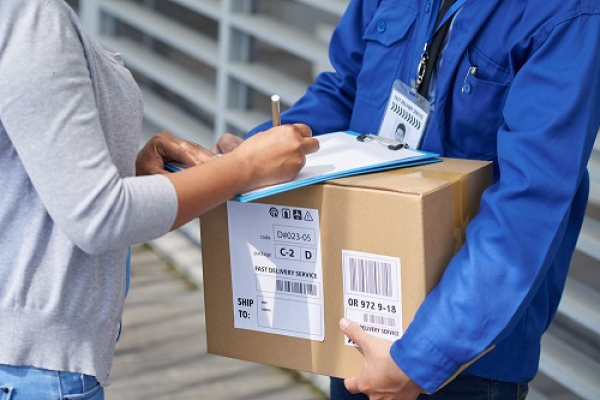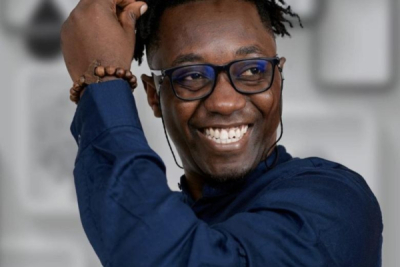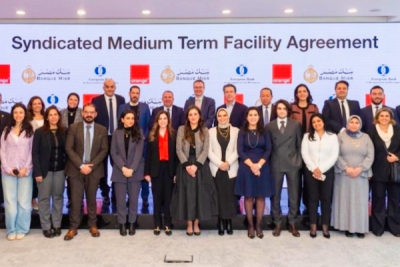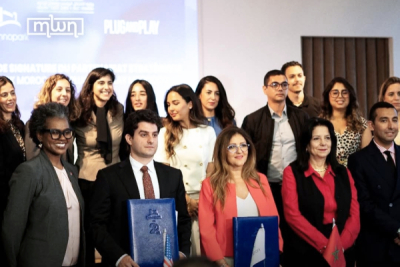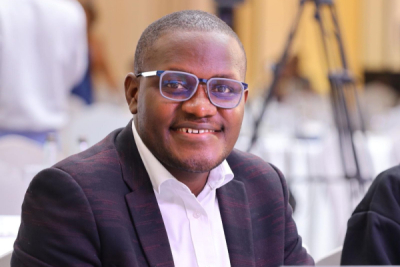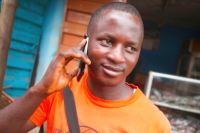With the rise of e-commerce in Africa, efficient logistics have become crucial. In Egypt, three tech entrepreneurs have developed a customized solution specifically for small and medium-sized businesses.
Turuq, a digital solution developed by an Egyptian startup, offers tailored last-mile delivery services. It aims to simplify logistics for small and medium-sized enterprises. Founded in 2023 by Ahmed Atta, Karim Kamal, and Ahmed Alaa, the platform seeks to handle the complexities of delivery, allowing businesses to focus on their core operations.
"From the warehouse to the doorstep, we handle the logistics so our clients can focus on what they do best: designing and selling great products," said Ahmed Atta, one of the co-founders.
While a dedicated mobile application is currently in development and expected in the coming months, users can access Turuq's services via a web browser. The platform combines full automation, end-to-end transparency, and operational efficiency to provide clients complete control over their delivery process, aiming to eliminate traditional logistics challenges.
Unlike some service providers that operate without technological infrastructure, Turuq has built an integrated platform that offers real-time updates, automated issue resolution, and complete visibility for both brands and end consumers. This digital approach is designed to prevent common misunderstandings between couriers and customers, thereby enhancing the overall delivery experience.
Turuq has reported a 94% customer retention rate and a 76% successful delivery rate even in complex urban environments. The startup operates on a pay-per-delivery pricing structure, with optional premium services, generating steady revenue while reducing delivery costs as its operations scale.
Adoni Conrad Quenum
After completing his studies, he settled in Gabon to develop technological solutions tailored to local needs. His work aims to improve access to electricity services through digital tools.
Birane Ndiaye, a communications expert and tech entrepreneur based in Gabon, is the founder and CEO of Orema Technology, a startup launched in 2018 specializing in connected solutions for the energy industry. The company develops tools based on the Internet of Things (IoT) to modernize the management of prepaid electricity meters, particularly those of Gabon's national energy and water company, Société d’Énergie et d’Eau du Gabon (SEEG), marketed under the EDAN brand.
Orema Technology designed a smart device linked to a mobile application, enabling users to check their consumption, recharge credit, and monitor usage in real time, all remotely via a smartphone.
"Buying EDAN credit and recharging your account during the rainy season, when it's crucial, really made us think," Ndiaye explained, recalling the project's origin in 2019. "Since all EDAN meters are installed outside the premises, we figured we had to find a solution that worked for everyone. Digital technology was the key to our problem."
Ndiaye holds a degree in public relations, advertising, and applied communication from the University of Johannesburg in South Africa. Before his entrepreneurial ventures, he served as CEO of the Société équatoriale des Mines (SEM) in Gabon between 2016 and 2017.
By Melchior Koba,
Editing by Sèna D. B. de Sodji
Growing up in the Democratic Republic of Congo, a country frequently impacted by humanitarian and climate crises, solidified his dedication to often-marginalized rural communities.
Joseph Tsongo is a Congolese entrepreneur dedicated to social and environmental causes, a commitment rooted in his upbringing in the Democratic Republic of Congo, a country frequently impacted by humanitarian and climate crises.
He is the founder and CEO of Jambo Lab, a tech startup launched in 2022. The company focuses on protecting vulnerable communities from the effects of climate change. Jambo Lab developed a web platform, also named Jambo Lab, that uses artificial intelligence and an SMS alert system. The platform aims to strengthen the adaptation of rural populations in the DRC by providing practical information on sustainable farming techniques.
Accessible even without a smartphone or internet connection, the platform allows residents, including Indigenous peoples and those displaced by war in the eastern part of the country, to interact and exchange information using basic mobile phones.
In parallel, Tsongo co-founded Jambo Radio in 2022, a mobile community media outlet where he serves as a storyteller. This media produces and broadcasts programs in local languages, combining online podcasts with group listening sessions followed by debates within listener clubs. The goal is to raise awareness of climate and environmental issues, combat disinformation, and promote fact-based local advocacy.
Tsongo's civic engagement predates these initiatives. In 2016, he established Amani-Institute ASBL, a youth movement with a socio-cultural mission focused on peacebuilding in eastern DRC. From 2014 to 2021, he also managed a community radio station that highlighted environmental issues within the Virunga Landscape.
By Melchior Koba,
Editing by Sèna D. B. de Sodji
While a few African countries have already launched 5G, Egypt is now preparing to deploy this technology. The support of international donors reflects the strategic stakes of this transition toward faster and more reliable connectivity.
The European Bank for Reconstruction and Development (EBRD) announced on Wednesday, May 28, a syndicated loan of $85 million to telecom operator Orange Egypt, in partnership with Banque Misr.
The financing aims to support Orange Egypt's acquisition of a 5G mobile license from the National Telecommunications Regulatory Authority and to fund the nationwide deployment of next-generation telecom infrastructure.
The loan is structured with a $44.5 million contribution from the EBRD and $40 million mobilized by Banque Misr’s Dubai branch.
"We are proud to partner with Banque Misr and the EBRD in a move that underscores international confidence in Egypt’s economy and supports our vision for advancing the telecommunications sector" said Mohamed Sayed, Chief Financial Officer of Orange Egypt. "Through technologies such as 5G, we aim to enhance services in education, healthcare and smart cities, bridging the digital divide and driving Egypt’s digital economy forward."
This project aligns with the "Digital Egypt 2030" strategy, spearheaded by the Egyptian government. In January 2024, the National Telecommunications Regulatory Authority awarded 5G licenses to several operators, including Orange Egypt, Vodafone Egypt, and e& Egypt, for a total of $675 million. These licenses also cover the renewal of previous generation authorizations for a 15-year period, without the addition of new frequency bands.
With the backing of the EBRD and Banque Misr, Orange Egypt plans to accelerate its 5G rollout and modernize its network. The technology is expected to significantly enhance users' digital experience through higher speeds, lower latency, and more reliable connections. It also paves the way for innovative services in key sectors, fostering an inclusive digital transition and contributing to a reduction of over 1.74 million tons of carbon dioxide emissions annually, in line with Egypt’s climate commitments.
The initiative comes amid robust demand for high-speed connectivity in Egypt. According to the Ministry of Information and Communication Technology, the country had 83.07 million internet users in July 2024, an 8.46% annual increase from 76.59 million a year earlier. Fixed internet subscribers reached 11.23 million, within an estimated total population of 112.71 million.
By Samira Njoya,
Editing by Sèna D. B. de Sodji
Tech startups are at the heart of Morocco’s innovation strategy. By connecting them to global markets, the country aims to establish itself as a digital hub in Africa.
Technopark Maroc, a business incubator for technology companies, and Plug and Play, a global innovation platform, signed a partnership agreement on Monday in Casablanca to launch an acceleration program for Moroccan startups.
The agreement was signed in the presence of Amal El Fallah Seghrouchni, Minister Delegate in charge of Digital Transition and Administrative Reform, and has the strategic support of the Ministry of Economy and Finance.
Under the partnership, an accelerator will be established within Technopark Casablanca to support more than 60 high-potential Moroccan startups over two years. The program will offer an intensive three-month curriculum focused on skills development, access to funding, connections to international markets, and preparation for scaling abroad.
This initiative aligns with Morocco’s digital strategy, Morocco Digital 2030, which aims to create 3,000 start-ups by 2030, including 1,000 by 2026, and to raise 7 billion dirhams ($761 million) in funding. The strategy depends on a dynamic ecosystem and strengthened public-private partnerships.
According to the Partech 2024 report, Morocco ranks sixth in Africa for tech fundraising, raising $82 million, which represents 75% of tech financing in North Africa and 36% in Francophone Africa. The Plug and Play program seeks to build on this momentum by encouraging investment, fostering local innovation, and integrating start-ups into global technology networks.
By hosting a world-renowned accelerator at the heart of Technopark, the project aims to structure support for young innovative companies, attract foreign investment, and enhance Morocco’s appeal as a hub for tech talent.
Plug and Play operates in more than 60 countries and will provide Moroccan start-ups access to a global network of over 550 corporate and technology partners, reinforcing Morocco’s ambition to become a leading innovation player on the African continent.
By Samira Njoya,
Editing by Sèna D. B. de Sodji
For several years, he has been developing concrete solutions for young Ugandans. Through his initiatives, he works directly in the field to strengthen digital skills and encourage entrepreneurship.
Keneth Twesigye, a Ugandan computer scientist and ardent advocate for entrepreneurship, is the founder and head of TechBuzz Hub, a startup incubator launched in 2016 with the mission of helping young entrepreneurs transform their project ideas into viable ventures.
Based in Uganda, TechBuzz Hub is a collaborative ecosystem that draws on experts across diverse fields including technology, business, social sciences, and creative arts. The incubator provides comprehensive training and support programs, offering its participants unlimited access to crucial resources such as mentorship, professional development training, coworking spaces, and advisory services.
Beyond direct incubation, TechBuzz Hub also organizes networking events designed to foster interaction among entrepreneurs, startups, and established business leaders. These gatherings facilitate synergy, knowledge sharing, and project monitoring, all under the guidance of experienced professionals.
In addition to his leadership at TechBuzz Hub, Twesigye plays a significant role in broader national initiatives. He oversees public policy at Startup Uganda, a key network connecting innovation stakeholders and organizations that support entrepreneurship. Demonstrating his commitment to public service, he also volunteers as a policy analyst at the Ugandan Ministry of Trade, Industry, and Cooperatives.
Twesigye earned his bachelor's degree in computer science from Uganda Technology and Management University in 2016. His expertise has also been sought internationally; in 2022, he collaborated with the United Nations Capital Development Fund (UNCDF) as a Google digital skills trainer. That same year, he contributed as a business development facilitator for AfriLabs, a pan-African network dedicated to supporting incubators and accelerators across the continent.
Melchior Koba
Last week, the Nigerian fintech successfully raised $4.2 million in a funding round. It plans to use the funds to accelerate its growth in Africa and develop its technology.
Carrot Credit, a Nigerian fintech startup founded in 2023 by Boluwatife Aiki-Raji, is enabling individuals and businesses to secure online loans using their digital investments as collateral. The platform offers a novel solution for those holding financial assets who might otherwise struggle to obtain traditional credit.
Carrot Credit allows users to borrow up to 40% of the value of their equity investments, including non-fungible tokens (NFTs) and cryptocurrencies, or up to 70% of their fixed-income assets, such as government bonds. This approach allows borrowers to access liquidity without having to sell their underlying investments.
The startup secures these loans by placing a lien on the digital assets through API integrations. This ensures that while Carrot Credit holds a claim, borrowers retain ownership of their investments. The repayment terms are flexible, offering fixed durations of 3, 6, or 12 months, or adjustable monthly payment options.
Carrot Credit's interest rates are designed to be competitive, providing an appealing alternative to existing credit options in the Nigerian market. The company operates on an integrated business-to-business-to-customer (B2B2C) model, forging partnerships with fintech platforms, brokers, and digital wealth managers across Africa. This strategy aims to broaden credit access and embed Carrot Credit's services directly into the financial routines of digitally-savvy consumers.
The fintech firm reports disbursing over $2 million in loans to more than 10,000 users so far. With its innovative model, Carrot Credit seeks to make credit more inclusive and better aligned with the digital investment habits of a new generation of African consumers.
"Access to credit shouldn’t be limited by geography or legacy infrastructure," said Boluwatife Aiki-Raji. "People in Nigeria and across Africa are already investing in digital assets –but there’s no ecosystem to help them unlock liquidity when it matters. Carrot is building that bridge, helping users leverage their investments and take cash out when they need liquidity the most."
By Adoni Conrad Quenum,
Editing by Feriol Bewa
Through several concrete projects, he leverages his technical skills to address the financial and health challenges faced by Africans, both on the continent and within the diaspora.
Oluwatomisin Kolawole (photo) is a Nigerian tech entrepreneur with an atypical background. A trained veterinary doctor, he is also a biomedical engineer and currently heads Reeple, a U.S.-based financial technology start-up he co-founded in 2022.
The startup offers cross-border payment solutions for Africans in the diaspora and freelancers around the world. It facilitates the transfer of funds to Nigeria from Europe, Canada, and the United States, while enabling users to receive international payments through the opening of bank accounts in the United States and Canada.
Reeple specifically targets freelancers, offering them simplified access to international banking services to receive payments from their clients, wherever they are in the world.
In parallel, Oluwatomisin Kolawole runs Vinsighte Limited, a digital health company founded in 2018. Using artificial intelligence, it improves the daily lives of blind or visually impaired people in Africa, providing them with greater autonomy and a better quality of life.
The entrepreneur holds a degree in biomedical engineering from the University of Lagos in Nigeria. He also has a doctorate in veterinary medicine from the University of Ibadan. His professional career began in 2012 at Texan Medical, a company specializing in the distribution of hospital equipment, where he worked as a biomedical engineer and marketing specialist.
In 2015, he joined Tomkol-Jahchen Organization, a social structure dedicated to training and mentoring youth, as director. At the same time, he worked as general secretary at Enactus, an organization that invests in student entrepreneurs. Three years later, he became brand manager at Unibadan Entrepreneur Network, an organization that identifies, connects, and trains young entrepreneurs from the University of Ibadan.
By Melchior Koba,
Editing by Sèna D. B. de Sodji
In fifteen years, technological advances have reshaped the telecom and digital markets in Africa, creating both opportunities and challenges. However, the inadequacy of regulations hinders harmonious growth, limiting the sector’s full potential and its economic impact.
In 2024, ten African countries reached the highest level of regulatory maturity in the field of information and communication technologies (ICT) and digital governance. Among them, Burkina Faso and Senegal joined the G3 category, alongside several countries from Europe, America, and Asia. This level corresponds to a regulatory ecosystem conducive to investment, innovation, and universal access. On its platform https://app.gen5.digital/, consulted on June 3, 2024, the International Telecommunication Union (ITU) reveals that they are now just a few points away from the G4 level, the highest, which characterizes integrated regulation aligned with economic and social development goals.
Top 10 African countries with the best ICT regulatory ecosystem
|
No. |
Country |
Points 2024 |
Level 2024 |
Points 2023 |
Level 2023 |
|
1 |
Kenya |
93 |
G4 |
71.91 |
G3 |
|
2 |
Nigeria |
92 |
G4 |
64.81 |
G2 |
|
3 |
South Africa |
88 |
G4 |
69.29 |
G2 |
|
4 |
Malawi |
87.50 |
G4 |
59.57 |
G2 |
|
5 |
Egypt |
87 |
G4 |
69.29 |
G2 |
|
6 |
Rwanda |
85.67 |
G4 |
63.58 |
G2 |
|
7 |
Morocco |
85.50 |
G4 |
58.49 |
G2 |
|
8 |
Uganda |
85 |
G4 |
55.56 |
G2 |
|
9 |
Burkina Faso |
84 |
G3 |
48.77 |
G2 |
|
10 |
Senegal |
82.67 |
G3 |
50 |
G2 |
Source: ITU
In its G5 framework, the ITU ranks 193 countries according to four levels of regulatory maturity, assessed through 70 indicators grouped into four pillars: national collaborative governance; policy design principles; digital development tools; political agenda for the digital economy. The index, scored out of 100 points, distinguishes four levels of regulatory maturity:
- G1 (limited): 0–40 points – Monopolistic markets, authoritarian approach
- G2 (intermediate): 40–70 points – Partial liberalization and privatization
- G3 (advanced): 70–85 points – Environment conducive to innovation and competition
- G4 (leader): 85–100 points – Harmonized regulation, driver of digital transformation
Progress, but not enough
Between 2023 and 2024, African countries made significant progress in their ICT regulation. The Covid-19 pandemic acted as a catalyst, revealing as early as 2020 the urgency of digital transformation but also the regulatory gaps to be filled, particularly in spectrum management reform and digital services taxation.
The results are visible today. Most African countries ranked G1 and G2 in 2023 have moved up to G3. Only three countries still show a very low level of regulatory maturity, a sign of positive momentum.
Although this evolution is commendable, it still falls short of the targets set by the ITU: achieving G4 level for the majority, to ensure a digital economy that serves the continent's socio-economic development. To achieve this, it is imperative to invest in institutional capacities, strengthen regional cooperation, and adopt inclusive policies so that digital benefits everyone.
By Muriel EDJO,
Editing by Sèna D. B. de Sodji
Ranking of African countries
|
No. |
Country |
Points 2024 |
Level 2024 |
Points 2023 |
Level 2023 |
|
11 |
Liberia |
82.33 |
G3 |
41.82 |
G2 |
|
12 |
Botswana |
82 |
G3 |
55.09 |
G2 |
|
13 |
Tanzania |
81.67 |
G3 |
55.25 |
G2 |
|
14 |
Ghana |
81 |
G3 |
64.20 |
G2 |
|
15 |
Mauritius |
80.50 |
G3 |
62.81 |
G2 |
|
16 |
Seychelles |
79.50 |
G3 |
20.37 |
G1 |
|
17 |
Eswatini |
79 |
G3 |
48.92 |
G2 |
|
18 |
Zambia |
78.33 |
G3 |
49.07 |
G2 |
|
19 |
Guinea |
76.33 |
G3 |
33.80 |
G1 |
|
20 |
Tunisia |
75.83 |
G3 |
39.35 |
G1 |
|
21 |
Angola |
75.67 |
G3 |
28.55 |
G1 |
|
22 |
Cameroon |
75.67 |
G3 |
38.27 |
G1 |
|
23 |
Sudan |
75.50 |
G3 |
59.10 |
G2 |
|
24 |
Comoros |
74.17 |
G3 |
30.56 |
G1 |
|
25 |
Cape Verde |
74 |
G3 |
50 |
G2 |
|
26 |
Côte d'Ivoire |
74 |
G3 |
50 |
G2 |
|
27 |
Gambia |
72.67 |
G3 |
41.36 |
G2 |
|
28 |
São Tomé and Príncipe |
72.67 |
G3 |
27.62 |
G1 |
|
29 |
Togo |
71.67 |
G3 |
43.83 |
G2 |
|
30 |
Lesotho |
70.50 |
G3 |
28.86 |
G1 |
|
31 |
Mozambique |
70.50 |
G3 |
22.22 |
G1 |
|
32 |
Zimbabwe |
70.33 |
G3 |
56.94 |
G2 |
|
33 |
Benin |
70 |
G3 |
67.59 |
G2 |
|
34 |
DR Congo |
70 |
G3 |
41.82 |
G2 |
|
35 |
Namibia |
68.67 |
G2 |
34.88 |
G1 |
|
36 |
Niger |
68 |
G2 |
40.59 |
G2 |
|
37 |
Mali |
67 |
G2 |
44.91 |
G2 |
|
38 |
Algeria |
66 |
G2 |
50.93 |
G2 |
|
39 |
Mauritania |
66 |
G2 |
44.29 |
G2 |
|
40 |
Gabon |
64 |
G2 |
29.78 |
G1 |
|
41 |
Sierra Leone |
61.17 |
G2 |
38.27 |
G1 |
|
42 |
Burundi |
60.67 |
G2 |
26.70 |
G1 |
|
43 |
Chad |
58.67 |
G2 |
41.36 |
G2 |
|
44 |
Central African Rep. |
53.50 |
G2 |
26.54 |
G1 |
|
45 |
South Sudan |
53.17 |
G2 |
||
|
46 |
Ethiopia |
52 |
G2 |
50.62 |
G2 |
|
47 |
Somalia |
50.50 |
G2 |
22.22 |
G1 |
|
48 |
Guinea-Bissau |
50.33 |
G2 |
26.85 |
G1 |
|
49 |
Equatorial Guinea |
50 |
G2 |
17.59 |
G1 |
|
50 |
Eritrea |
14 |
G1 |
8.33 |
G1 |
|
51 |
Libya |
12.67 |
G1 |
3.70 |
G1 |
|
52 |
Djibouti |
4.50 |
G1 |
23.15 |
G1 |
Source: ITU
Regulatory Maturity Categories (ITU G5 Framework):
- G1 (limited): 0–40 points
- G2 (intermediate): 40–70 points
- G3 (advanced): 70–85 points
- G4 (leader): 85–100 points
• Tunisia urges firms to join e-invoicing before July 2025 sanctions.
• Applies to state-linked, large, pharma, and fuel firms.
• Aims to cut tax fraud; digital gaps persist.
Tunisia's General Directorate of Taxes (DGI) issued a warning last Saturday, urging all unregistered Tunisian companies to enroll in the national electronic invoicing system. The directive comes ahead of sanctions for non-compliance set to take effect in July 2025, marking a crucial phase in the country's digital tax reform.
This mandatory registration extends to a broad spectrum of economic players, including businesses engaged with the State or local authorities, those operating under the Directorate of Large Enterprises (DGE), and companies involved in interprofessional transactions within the pharmaceutical and hydrocarbon sectors, excluding retail trade. To comply, affected firms must register through the Tunisia TradeNet (TTN) platform, which serves as the official technical operator for the system’s deployment. The DGI's twin objectives are to bolster the traceability of commercial operations and to streamline tax procedures through automated data processing.
This initiative is a cornerstone of Tunisia's drive to modernize its tax system, impelled by both domestic imperatives and international commitments to transparency and sound governance. The digitalization of invoicing complements a series of existing measures designed to combat tax evasion, a persistent issue estimated to cost Tunisia approximately 3 billion dinars annually. It underscores the government's resolve to enhance tax efficiency and tighten control over commercial transactions.
In the long term, the widespread adoption of electronic invoicing has the potential to fundamentally reshape the relationship between the tax administration and businesses. If implemented effectively, this reform is expected to significantly curb fraud, simplify audit processes, and ultimately restore greater confidence in Tunisia's tax system.
However, the ambitious rollout of electronic invoicing faces structural challenges. While Tunisia’s internet access rate reached 84.9% in 2025, a 5% increase from the previous year, and mobile phone penetration stands at about 136.5%, indicating widespread mobile connectivity, disparities persist. Notably, digital tool adoption remains low in rural areas and among small businesses. These gaps highlight an urgent need for enhanced support, including targeted training and technical assistance, to ensure that all segments of the economic landscape are fully included in this crucial digital transition.
By Samira Njoya,
Editing by Sèna D. B. de Sodji
More...
Payment infrastructure company Fincra has secured a Third-Party Payment Provider (TPPP) License in South Africa, in partnership with Nedbank.
This regulatory milestone strengthens Fincra’s footprint in Southern Africa and advances its mission to build seamless, borderless financial infrastructure across the continent.
With this license, Fincra is now authorized to process a wide range of payment services in South Africa, including credit and debit card payments, Electronic Funds Transfer (EFT) credits, Real-Time Clearing (RTC), and Rapid Payments.
This Morocco-based fintech aims to optimize various key processes within African financial institutions, in order to improve service quality for users.
PayTic is a B2B fintech solution developed by a Moroccan startup. It enables the automation of operational processes related to bank cards, a segment that remains largely fragmented in many African institutions. The Casablanca-based startup was founded in 2020 by Imad Boumahdi. Last April, it successfully closed a funding round worth USD 4 million.
“This significant investment is a powerful validation of PayTic’s mission and the transformative impact we are delivering. [...] Beyond the capital, this funding round brings invaluable strategic expertise, allowing us to accelerate our global expansion and reshape the future of payment operations,” said Imad Boumahdi.
Operating as a Software-as-a-Service (SaaS) platform, PayTic delivers comprehensive automation directly through a web browser. Banks, card issuers, and fintechs can use it to better manage their debit and credit cards.
It acts as an intelligent assistant to perform tasks such as payment tracking, error resolution, performance analysis, and compliance. It integrates with existing systems and provides these various institutions with a real-time view of their operations, while reducing the risk of human error.
In a context where banks seek to increase efficiency while improving customer experience, PayTic’s goal is to automate what can be automated in order to refocus teams on higher-value tasks. This objective aligns with the broader dynamic of modernizing African financial services, driven by high-value local solutions.
By Adoni Conrad Quenum,
Editing by Feriol Bewa
In a context where African edtech tools still struggle to meet the specific educational needs of the continent’s students, this solution stands out for its local relevance and ease of use, even on low-powered machines.
Kenyan startup ElimuShop has launched Equation Explorer, an interactive application designed to transform the learning of mathematical equations, making it more accessible, engaging, and visual. The tool targets secondary school students, educators, and self-taught individuals keen to grasp the fundamentals of algebra.
Founded in 2017 by Lilian Nyaranga, ElimuShop describes itself as a social enterprise. "We are dedicated to creating innovative game-based resources that make learning mathematics and science engaging and fun for children," the startup stated. "Our interactive tools help young learners develop critical thinking, problem-solving skills, and a passion for STEM [science, technology, engineering, and mathematics] subjects."
Equation Explorer provides an intuitive interface where users can manipulate, visualize, and solve equations step by step, observing the immediate impact of each operation on both sides of the equation. Emphasizing hands-on experimentation, the platform functions as a virtual mathematical laboratory where students learn by doing. The tool also incorporates an immediate feedback system that identifies and explains errors as they occur, thereby reinforcing the understanding of equivalence rules and problem-solving methodologies.
This innovative solution aligns with ElimuShop's broader mission to democratize access to high-quality digital educational content, with a strong focus on active and contextualized learning. With Equation Explorer, the often abstract process of solving equations becomes more concrete, more engaging, and ultimately more accessible to a wider audience.
In a significant endorsement, ElimuShop was selected in 2025, alongside eleven other startups, to join the third cohort of the prestigious Mastercard Foundation EdTech Fellowship.
By Adoni Conrad Quenum,
Editing by Feriol Bewa
She launched her company after encountering a specific problem related to her daughter's school transportation. Her professional background, marked by roles in the sales, logistics, and digital sectors, prepared her to design an appropriate solution.
Lucy Kimani (photo) is a Kenyan tech entrepreneur and co-founder of NoMa, a startup launched in 2023 that aims to transform school transportation in Kenya through an innovative digital solution.
NoMa offers a SaaS platform that enables schools and parents to track school bus routes in real time, thereby ensuring greater safety and efficiency in students’ daily commutes.
The idea was born from a personal experience. While her daughter was attending preschool, Lucy Kimani often found herself without information about the school bus's arrival. “Oftentimes she did not know where the bus was and if it was late, she had to wait helplessly without being sure if her child was safe or if the bus had encountered a problem on the route. How could she get more visibility of her child’s journey home? Thus the idea for NoMa was born. Out of a need to provide peace of mind to other parents like her,” explains the startup.
NoMa’s platform is based on advanced algorithms that optimize routes, reduce waiting times, and efficiently coordinate school transportation. By leveraging real-time data, the solution promises a more reliable, smooth, and secure experience for both students and parents.
Lucy Kimani graduated from Kenya Methodist University, where she earned a bachelor’s degree in human resource management, sales, and marketing in 2012. She also holds a master’s degree in strategic management, obtained in 2018 from the United States International University in Africa (Nairobi, Kenya).
Her professional career began in 2003 at Kapa Oil Refineries, a manufacturer of fats and cooking oils, where she held a position in sales and marketing. Two years later, she joined Mooreland Consolidated Hotel as operations manager, before becoming a legal secretary in 2007 at the law firm Karingu & Company Advocates.
Between 2012 and 2019, she worked for Copia Kenya, an e-commerce startup, where she successively held roles as sales manager, head of recruitment, training and development, then head of business development. Between 2021 and 2022, she served as vice president of growth at Amitruck, a tech logistics startup.
By Melchior Koba,
Editing by Sèna D. B. de Sodji


